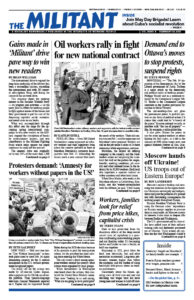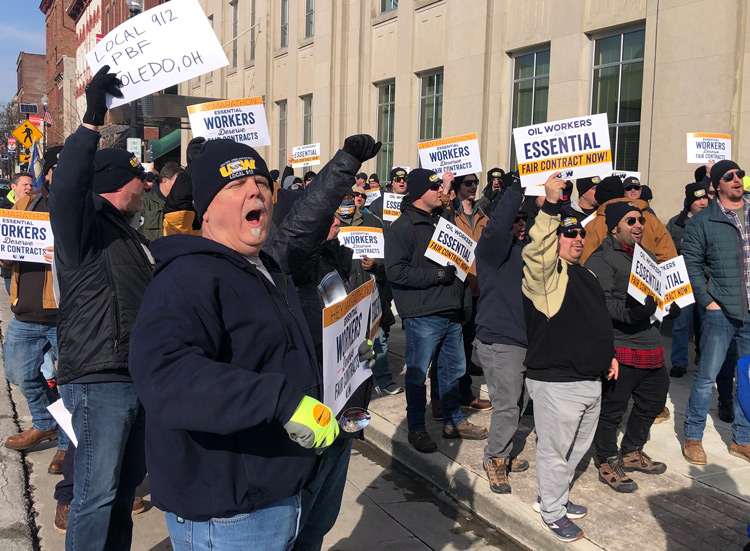FINDLAY, Ohio — Over 200 United Steelworkers union-organized oil refinery workers and their supporters from across the country gathered in front of Marathon Petroleum’s corporate headquarters here Feb. 15 demanding the bosses reach a new contract that meets the needs of the workers. Their old contract ran out Feb. 1 and the union rejected Marathon’s latest proposal. Workers are still on the job under a series of 24-hour extensions while negotiations continue.
Marathon, the largest oil refining company in the country, and the Steelworkers union are bargaining for a contract that will set the pattern for wages, benefits, working conditions, job security and other national issues in the industry for its 30,000 workers. Each local also negotiates a separate contract on safety questions and other local issues.
When Dave Martin, who works at the Marathon refinery in Catlettsburg, Kentucky, saw this worker-correspondent with the Militant, he said, “I bet I know what paper you’re with! You guys rode with us to our picket lines back in 2015.”
Some 5,200 refinery workers went out on strike that year over safety issues, including the bosses’ push for 12-hour shifts, which would make working conditions more dangerous.
Martin explained Marathon hasn’t addressed any of the proposals the union has brought to the table, including on wages, benefits and safety concerns. Another important issue concerns projected carbon-capture projects, where companies plan to use new technology to capture carbon emissions from their refineries and turn them into a new source of energy.
“The companies don’t seem to care if workers weigh in, but of course it’ll be us doing the work,” he said.
Samir Hazboun, Socialist Workers Party candidate for U.S. Senate in Ohio, who had come to join the protest and offer the SWP’s solidarity, agreed. “We know the working class has to be the real steward of both labor and nature. The bosses don’t care what happens along the way in their relentless drive for profit.”
“Right,” Martin said, “To the companies it’s always safety third and profit first.”
Cindy Bogart Barnhill, an operator in a chemical plant in Lima and member of Steelworkers Local 1-00626, explained how the bosses cut corners on safety. “Much of training now is on the computer. The company calls it ‘Virtual Training Assistant.’ Once you answer correctly a few questions, you’re now ‘safety qualified,’ they say,” Barnhill said. “Then if you get hurt, they point out you passed the course. They say it’s your fault. And that place is dangerous!
“I live two blocks from the plant,” she said. “Thankfully, the spills and fires so far have only required ‘shelter in place’ warnings, not evacuations.”
Overtime, onerous schedules
The workers also face abusive and dangerous schedules. Martin reported that in the two months leading up to Thanksgiving he had only three days off. Most refinery workers are working six to seven days a week. With industry turnaround coming up, a time when the refineries shut down to retool and then reopen, workers know their schedules will get worse.
Workers are expecting an expanded turnaround this year, as a substantial amount of planned work at the refineries was delayed during the pandemic. “How much overtime are you guys working? 50, 60, 70, 80 hours?” Eric Schultz, president of Steelworkers Local 7-1 at BP in Whiting, Indiana, asked the crowd. “The answer is too damn much!” The workers answered back with a chant of “Stand up, fight back!”
Byron Cavera, who’s worked at the plant for five years, said this was the first union action he’d attended. “I love the way we’ve all come together from different refineries around the country in solidarity,” he said.
“Greed is at the heart of the issue here. The company always claims that safety is its number one priority, but then we’re out in the field, the bosses’ only concern is the production numbers,” he said. “And then you’re regarded as the bad guy for simply trying to follow the company’s own policies on safety!”
“We have Steelworkers from Pennsylvania, Kentucky, Indiana, Texas, Washington and Ohio here with us today,” Mike Smith, chair of the union’s National Oil Bargaining Committee, told the rally. “This fight isn’t just about wages! The industry has changed quite a bit and we need a lot of security and safety nets for our members. We’ve been coming to work every day for the past two years. We can’t do our jobs from home like management, and now this company can’t address our concerns? They’ve made record profits.”
Steelworkers held solidarity actions elsewhere. More than 100 members of USW Local 7-1 rallied outside the BP refinery in Whiting. Their rally ended on a spirited note, with unionists promising they’d be back as many times as it takes to force Marathon to take their demands seriously.
Naomi Craine contributed to this article.


